It’s raining again. I swear I’ve only seen Breightmet once in the sunshine since I’ve been embedded in this UCAN two months ago.
I might only be here one day a week but I’m definitely getting the feel for what they are about. There’s half a page of bullet points in my notebook and, before she gets sidetracked with someone else, I ask Vanessa if I can confirm my observations with her. We sit upstairs in her office.
“There’s a lot of ‘drawing people in’, isn’t there? You know, offering things that just get people through the door, like the knitting and the football?”
“… and the IT. They are what we call our engagement tools,” says Vanessa. “We don’t force things down people’s throats. It’s not a compulsory service, people can come in and ask for whatever they need and we will try to help. That leads to conversations and, because we’re right here, we have the space and time to build relationships and trust.”
“Sorry. Why is the IT an engagement tool?”
“At most community venues you have to book a slot on the computers and use them for a specific purpose. Here, we wouldn’t have a problem with customers initially coming in just to use Facebook for example.”
“Just to get them through the door… so you can start those conversations?”
“Exactly. We are the hook.”
“And then, once you get to know them, you find out what issues they have and direct them to different services. It’s sounds simple.”
Vanessa laughs. A sort of it-might-sound-simple-but-it’s-really-quite-challenging kind of laugh.
“And because you’re not a compulsory service,” I continue, “it means you can be very fluid, very adaptable to what people need.”
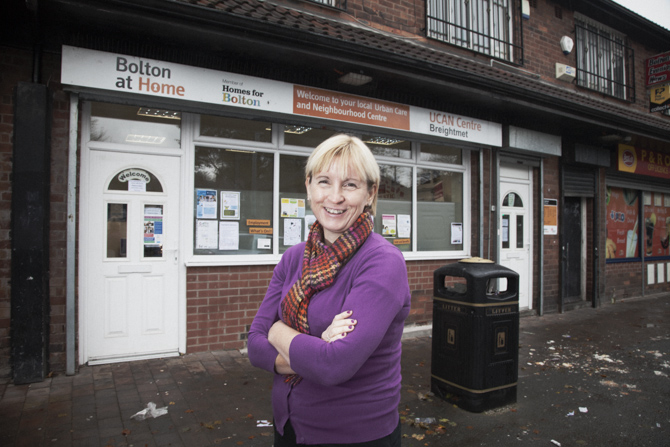
I’m hitting the nail on the head. Vanessa talks about the flexibility they have with the limited space available. They can invite different services – like the credit union or the employment support advisors – to deliver their services from the UCAN, and the symbiotic relationship ticks boxes for them all.
“So, if the UCAN is so great, why is it not replicated around the country?” I ask.
“That is such a good question, such a fantastic question,” – I try my hardest not to beam – “I think it’s because it’s just too simple.”
“Too simple?”
“Some organisations have these multi-million pound showbiz buildings with ‘meeters and greeters’ behind reception desks – all very posh and clinical – which are about giving the customer a sophisticated experience of a venue rather than offering them what they need. I’m not saying we’re not sophisticated because the UCAN model is very sophisticated but it’s also very simple.”
“Do you think some organisations can’t see the wood for the trees?”
“Some have become very compartmentalised. You have to go to that enquiry desk to do one thing; ring that person to do another or go online to do a third. Some think it’s easier – more cost effective even – to manage customers from a distance. Everyone has a specific role to play, it’s almost like a department store model.
“Here we are the constant hook, we can help people ourselves or refer them to services inside or outside of the UCAN. You really need to see this place to understand how it works in practice. And we have to remember that despite all the new technology there are still a lot of customers out there that need a specific level of meaningful support that can only come from personal, human contact.”
Vanessa is off on one now. And quite rightly. She’s evangelical about the support the UCAN provides and sees it as a model that can work elsewhere. As well as everything else, she’ll be giving guided tours soon.
“By having those conversations we’re empowering customers to – at some point – take control of their own solutions by giving them options in a very informal, non-judgmental way.”
There’s talk in the kitchen about a football game tomorrow. Carl has been encouraging local men to come down to a weekly lunchtime kick-about organised by Bolton at Home and Bolton Wanderers.
“You could come too,” he says as he gives me a leaflet. I’m not sure whether he means to play or to watch. Hopefully it’s to watch.
“I will,” I say, “maybe not tomorrow but I’ll come down some time and take some pictures.”
Dawn from Money Skills is in the small office next to the kitchen. Her first client has just texted to say she’ll be late – her son has been sent home from school. “Can I ask you a few questions while you are waiting?” I ask.
Dawn agrees and starts by explaining that Money Skills is a confidential, impartial money advice service to help people on low incomes with budgeting, banking and saving, and even energy efficiency.
“So why are you here, at the Breightmet UCAN?” It sounds a bit rude but thankfully Dawn understands what I’m getting at.
“We have offices in town but, of course, we realise that those with money issues can’t always afford the bus fares. We position ourselves in the community so people can access us easily.”
Dawn has been giving Bolton residents money advice for the last seven years. “But now there is more demand than ever,” she says, “and it’s getting tougher. In the past there were always things we could do to help customers. Now, with the welfare reforms, there are going to be some customers that will still struggle no matter how much we maximise their income and minimise their expenditure. There just isn’t enough money coming into the household to support them.”
“What’s changed in particular?” I ask.
“The bedroom tax is proving very difficult. If you’re a single person or you’re on Jobseeker’s Allowance then there’s not much slack. Finding another 11% of your rent [for one extra bedroom] can be quite substantial for someone who’s only receiving £71 a week.”
“The government would say that Universal Credit will make things more straightforward,” I suggest. “Will it make it easier for people to manage their money?”
“Despite all the publicity a lot of people just aren’t aware of it,” says Dawn. “They will only get their money once a month and they might not have anticipated that. And it will be paid in arrears so there will be a period when there will be no money coming in until the payment reaches them.”
“So, when it’s introduced, do you mean there will be a gap in people’s payments?”
“Depending on their payment date, yes. We are trying to warn people about that. They really need to be thinking about that now and maybe put, say a pound a week away, so they have some money built up for when it does affect them. There’s a lot to think about.”
I’m intrigued by Dawn’s work. She’s right at the sharp end of the reforms, trying to help those at crisis point. “If you see someone who is obviously not coping, what do you do? What can you do?”
“We have to gather all the facts: find out where they live, whether or not the rent is being paid, what benefits they are claiming. We are seeing quite a few clients now who have had their benefits stopped – they’ve been sanctioned by the JobCentre for some reason – and are on nil income. We need to find out why and try to resolve that quickly.”
Dawn says she tries to put things on hold for those clients. She’ll talk to their landlord – often Bolton at Home – and their utility companies and ask for breathing space, time to get things sorted.
“If clients have no money for food, which is usually the case, we have links with all the food banks around here. We can give them vouchers whilst we are trying to get their finances sorted.”
“Have you seen more food banks set up since you started?”
“Oh gosh. There were no food banks when I started. Now there are lots, and they’re all in high demand. We do have some emergency food parcels back at the office because the local food bank is only open once a week. So we might have to organise for an emergency parcel to be delivered until they can go to the food bank.”
There’s a gentle knock on the open door. I make way for Dawn’s first client of the day.
It’s pelting down and everyone who comes into the front office this morning looks like a drowned rat.
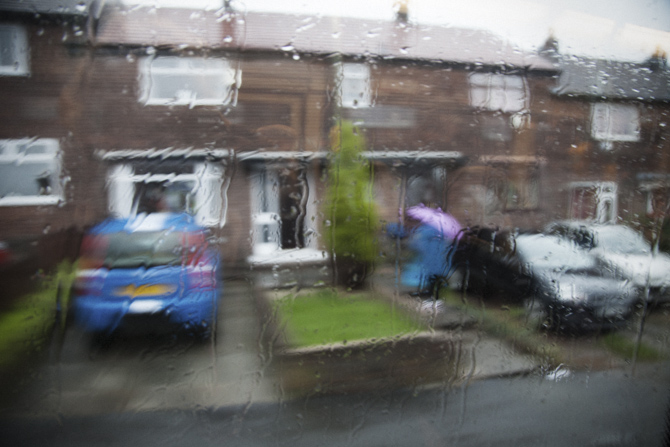
Today is money day again at the UCAN. The place is only open for those who want to see the local credit union, Hoot, or have an appointment with Dawn from Money Skills. Oh, and Jade is upstairs waiting to see her ‘Think Positive’ clients.
Hoot’s first customer is early. Nick has come to make his regular loan re-payment and, as Steve from Hoot has yet to set up his stall in the corner of the front office, I grab my opportunity. “Can I have a chat… about why you use the credit union?”
“You can ask me what you like,” says Nick, happy to help. “I could tell you my life story if you’ve got time.”
I suggest there might not be enough tape in my recorder and instead ask him how long he’s been with Hoot. “Three years. And I’ve had a new loan off them each year. Every fortnight I pay off some of the loan and put something into a savings account. They use people’s savings to give out other loans.”
Nick explains that he uses Hoot as a way of budgeting across the year. The loan he takes out each October pays for Christmas and it takes him 12 months to pay it back, then he takes out another.
“What is your income, are you on benefits?”
“I get child benefits, family tax credits and employment support allowance, and that’s because I’m under the Mental Health Act, I’ve been under them for 20 odd years.”
“They’ll only give you what they think you can afford to pay back. Before they start they work out what money you’ve got coming in and what your bills are and that.
“If this wasn’t around where could you go?”
“The only other thing is a budgeting loan from the Department of Health and Social Security, [now the DWP].”
“And what about loan sharks? Have you had any experience of loan sharks?”
“I’ve used three or four of them in the past. But, If you borrow £100 they’ll be asking for £250 back,” he says. “They always want more from you. That’s what they do on this estate, they prey on people on ‘social’. They’ll go to the door and say you can have a £200 cash loan and there won’t be many – especially at this time of year – who won’t take it.”
“What if you don’t pay it back?”
“The official ones – the likes of Shopacheck and that – they’ll just send someone round from head office but there are others that’ll send the heavies round… give you a few slaps. You know what I mean?”
Steve is ready now.
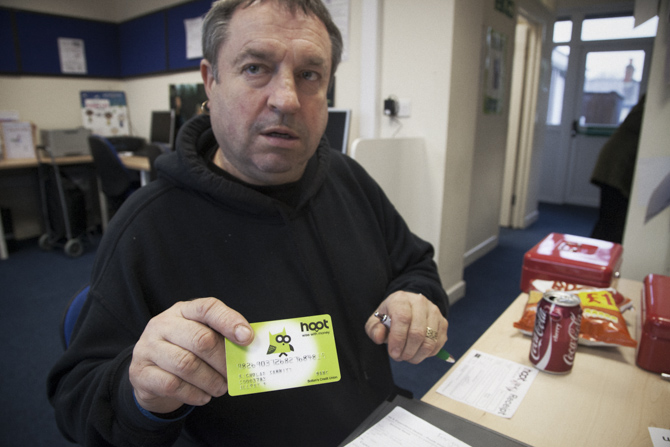
Nick has his card, and his payments, and all the receipt slips from his fortnightly visits in a plastic folder. “I always keep it organised,” he says. “So here’s £30, that’s £28 off the loan and £2 going into the savings, right?”
“Okay,” says Steve, filling out another receipt form.
“And here’s what they do,” says Nick, “showing me a kind of income and expenditure analysis that he’s had to complete before getting his loan. “They won’t give you the money unless they know you can pay it back.”
“Is he your best customer, Steve?” I joke.
“He’s a good customer.”
“And I get a pen every time I come in!” laughs Nick, picking up one of the Hoot pens off the desk.
“He pinches one every time he comes in!” laughs Steve with him.
… continued from Hardworking people
Kellyann has to pick up Jackson from nursery soon and I ask to tag along so I can take some pictures of her. “When I’m not at uni or working, I like to go and collect him. And it gives Paul a break.”
As we walk up the road opposite the UCAN, Kellyann tells me about their move across town from Farnworth, where she grew up. “We had a one-bedroomed flat on a bad street,” she says, “there were dealers and drug addicts banging on our windows the whole time. We asked to be moved but it took us three years – and loads of support from local councillors, the police and solicitors – before they offered us something else.”
“And was moving here to Breightmet your choice?”
“To be perfectly honest with you, it was the only house they offered us. I had no family up here but Paul used to work nearby and said it was fine. It honestly didn’t bother me. I’d heard it was rough, but at the end of the day they were offering us a house. And I love it up here now.”
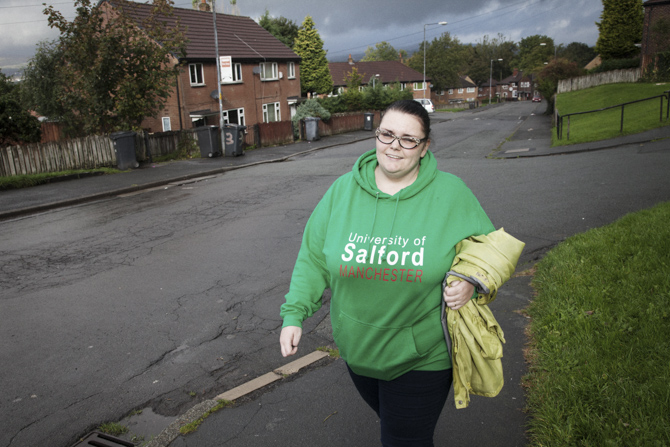
“What was your first reaction when you saw the house? You must have been over the moon?”
“The lady who had lived there before us had just died and I remember opening the side gate and all the funeral wreaths were still up the path. I was mortified, absolutely mortified: it was the dead lady’s house….Oh, it’s weird being photographed, just walking along.”
“People will think you’re famous!”
“They promised they’d do a lot of work on the house, but it’s never been done. My bedroom has never been decorated. They promised they’d re-skim the walls after some electric problem, but never have. But am I bothered? I’ve got a house, it’s warm and I’ve got good neighbours. I’m quite happy. My kids are happy. All that will come.”
We’re early and so we sit on the pub wall opposite the primary school.
“Tell me about the UCAN. How did that all start?”
“I got dragged in! I wasn’t very well. I was suffering with postnatal depression after I’d had Jackson. It wasn’t an easy birth. And one of my friends was coming to the knitting group and she literally grabbed me by the hand and dragged me in.
“They were all laughing at my hair! It was pink and purple at the time.”
“There’s a lot of pink and purple hair in Breightmet,” I say. And there is.
“I started it,” she laughs.
The ‘naughty knitters’ group got Kellyann through the uPVC front door, nearly three years ago. Since then she’s been on pretty much everything the UCAN has to offer. She now runs the group. Most recently Vanessa has helped her with the bursary application.
“The bursary is means-tested,” she explains. “So I had to get a letter from the Jobcentre to confirm my tax credits. It took them ages. At first Vanessa was emailing twice a week, then ringing every day. It took eight weeks to write that letter.”
“Which is why your bursary is late and you’re still having to work?” I ask.
Kellyann nods.
The school gate is opened and we walk round to the classroom entrance. “What would you have done, if the UCAN hadn’t been here?”
“I’d be stuck. I’d have still been ill for a start. I know it was only knitting but it got me back out talking to people and it gave me something to look forward to. I started to go out – I’d had agoraphobia – and I started talking to the mums at the school gate. I came off my medication, finished my therapy, started and finished an access course with brilliant marks, then got one of 60 places at uni from over 1,800 applicants.”
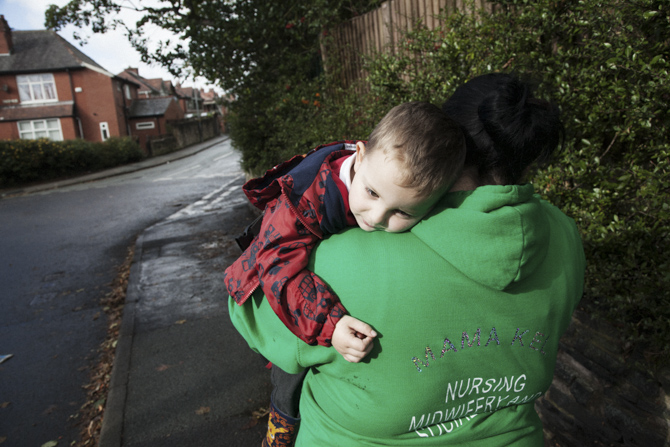
“Would you put starting your university degree down to walking into the UCAN?”
“Absolutely,” she says as a three-year-old is reunited with his mother and is immediately handed a chocolate egg. “UCAN fired the starting pistol for me.”
Jackson is delighted to see his mum and unfazed by the stranger with her. “Can we go to the shop?” he asks, glancing at his classmate unwrapping the egg.
“Not today mate.”
It’s not one of her uni days so Kellyann has agreed to come into the UCAN for a chat. Vanessa shows us to the small meeting room upstairs. “Will you be all right up here?” she asks, “it’s a bit chilly.”
Kellyann and I tell her we’ll be fine. I set off my tape recorder and hear that Kellyann has only lived in Breightmet for the last five years. She’s married to stay-at-home dad Paul and they have a seven-year-old daughter and a three-year-old son. Now 28, she’s just started a three-year degree course in mental health nursing at Salford University, a 90-minute bus ride away.
“It’s not the first time I’ve been to uni,” she says. “After my A-levels I started an adult nursing course but it didn’t work out and within a year I was working at my local Asda.
After that I got a cleaning job at the Royal Bolton Hospital and, five years later, I’m still there.”
Kellyann is waiting for a bursary to come through – the NHS pays for her to study – but until it does she has no choice but to continue working.
“Bills need to be paid,” she says, pragmatically. “And it’s good for my children to learn that you need to get off your butt and contribute to society.”
This week she’s at university three days, last week it was five. “Depending on my studying, I pick the hours I work,” she says, “Usually I do every weekend and a couple of evenings in the week.”
“You’re on a zero hours contract?” She nods. “What if they say there’s no work for you this week? Do you have anything to fall back on?”
“No, nothing,” she says.
“How many hours do you work at the weekend?”
“I start at half past seven in the morning and the earliest I finish is two o’clock. Then I have housework, university work and I’ve got two kids that miss me. They’re not long hours but it’s still draining because I’m up at half past four.”
“Half past four?” There’s more astonishment in my voice than I had intended.
“Out by half five,” says Kellyann “and, because of the stupid times of buses in and out of town, it takes me two hours to get to work.” (I ask Vanessa later: it’s a fifteen minute drive from Breightmet to the Royal Bolton.)
“And then the next day you do the same? That’s hard work. And, if you don’t mind me asking, how much do you earn with the cleaning job?”
“On a Saturday it’s about nine or ten pounds an hour. On a Sunday, it’s nearer £13 an hour.”
“Things must be tough.”
“Today I’ve got nothing in my purse and won’t have until Friday. And every week is different. I get paid every fortnight so we call that ‘the good week’ and the following week, when I just get tax credits, we call that ‘the bad week’. Every fourth week, I get wages, tax credits and child benefit and so that’s when we try and do a big shop and get any extras. I’ve got to get the kids some winter boots soon.
“But we’re getting used to cutting back in our shopping. Things are getting harder. Gas and electric have gone through the roof. You have to consider everything. I don’t buy brands, you have to get the next best thing. You have to really watch what you’re doing.
“We’re struggling but there are some people on benefits who are already sorted for Christmas. I think it’s disgusting. The benefit system stinks. Some people can claim for one lot and the next person can’t. Paul’s looking for work but can’t claim anything because they say I’m paid too much.”
“What would you like to get for the kids if you had more money?”
Kellyann doesn’t need to think. “A holiday,” she says, straight off.
“When was the last time you had a holiday?”
She begins to cry. “I’m sorry,” I say. “I didn’t mean to upset you.”
“It’s all right,” she says, putting a finger behind her glasses to wipe her eyes. “The last time Paul and I were away was our four-day honeymoon in the Lake District, eight years ago. The kids have never been away.”
Continued in “My kids are happy”





